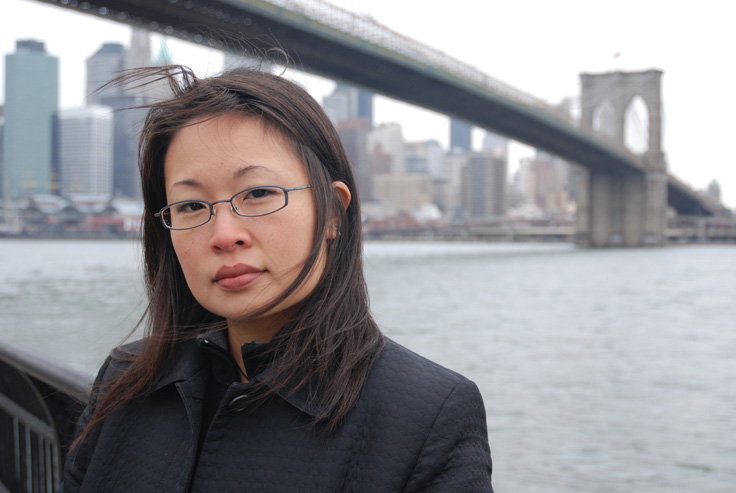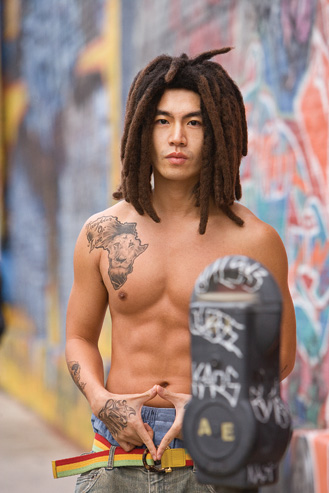By Helin Jung
Regina Park interviewed more than 40 academics, journalists and surgeons for her film, but it turned out to be as much a personal examination as a professional pursuit.
Regina Park wants answers.
At an interview in which she is the subject, Park awaits a table at Koryodang Bakery in Manhattan’s Koreatown strip. It’s a chilly fall evening and Park is swaddled in outerwear, as she explains that she is suffering from jetlag upon her recent return from a trip to Bangkok.
When asked about her occupation, she replies, “I’m sure you don’t want a boring play-by-play of my day.”
Raising her voice to be heard over a booming club remix of Amy Winehouse’s “Rehab,” Park cheerfully commands, “Tell me about what you do! What is it like?”
Park, a first-time documentary filmmaker, much prefers asking questions to answering them. She has been quietly promoting her film, “Never Perfect,” a feature-length exploration of double eyelid surgery.
The second child of Korean immigrants who owned a small chemical solvent company, Park, 33, was raised in Cincinnati at a time when there were few other Asians living there.
Park started dreaming about becoming a filmmaker when she was in high school. During her undergraduate education at Barnard (she fled the Midwest as soon as she could), Park participated in graduate film projects. Her professional life has included stints with Academy Award winners Michael Moore and Jessica Yu, and though she still supplements her income with freelance work, she currently pursues her own film projects full-time.
Park’s mother frequently traveled to Korea, returning with bags of store-bought, eyelid tape intended for her single-lidded daughter. “Just try it,” her mother pleaded, chasing her around the house. “‘Just try it!’“
The tape would double the crease along the lid, Park says, making her eyes appear larger, which her mother considered a more attractive look. To be placating, Park reluctantly applied the sticky plastic on her eyes.
Her mother also suggested surgery, but Park resisted. (“I always had a strong connection to my single-lidded eyes.”) However, a fascination with eyelid surgery stayed with her.
The idea for “Never Perfect” formed in 2004 on a whim. There was a vague plan (“some man-on-the-street interviews”) that might have amounted to a short film, Park says, but it morphed into a more encompassing endeavor.
She discovered that the prevalence of eyelid surgery among Asians around the world is tied to identity, perceptions of beauty, and how these are formed. It would take more than 10 minutes to tell the story, she realized. But, as time is money, where would the funding come from?
As it turns out, it ended up coming from Park’s pocket. She, along with her husband and co-producer, Ted Robinson, financed it independently.
“Not really having a guarantee that anything was going to happen, I just took the leap, crossed my fingers and did it,” Park says.
The rest of the process also functioned as a gamble. They worked for three years, interviewing more than 40 academics, journalists and plastic surgeons, all without having found a willing interviewee who would provide the narrative thrust of the film.
“I could not find her,” Park says, speaking of the person who would serve as the film’s main subject. “Admitting to having surgery is not an open thing. … It is so commonly done, but people are very reticent.”
After nearly a year of looking for a subject via Internet searches and correspondence, and through different doctors’ offices, Park found Mai-Anh Tran, a 27-year-old Vietnamese businesswoman from Southern California.
Tran’s decision to be filmed was a “thoughtful” one,” Park says, describing how Tran agreed after taking some time to think about it. Tran said she felt she would learn more about herself by participating in the film. She has yet to see the completed production — a prospect that makes Park rather nervous.
“I think that my portrayal of her is honest,” Park says. “I don’t think it’s a negative portrayal.”
“Never Perfect” has had “modest” success, garnering praise at Stateside film festivals, including a Silver Remi Award at the 40th WorldFest International Film Festival in Texas. It had a run in Seoul at the EBS International Documentary Festival, and has been sold recently for distribution on DVD and airing on television.
Park’s next project is about HIV/AIDS education. Again, she will work with Robinson. They plan to film in the U.S. and Thailand.
The filmmaker’s inquisitive nature accompanies her following the interview, as Robinson shows up to meet Park for dinner. As they relax in a booth at Wonjo Korean Restaurant, a popular tableside BBQ restaurant on 32nd Street, Park orders sundubu, and Robinson orders his meal, kimchi bokkeum, in Korean.
When the side dishes are presented at the table, the Korean-style potato salad ends up squarely in front of her husband.
“Have you noticed,” Parks says, “that they always put the potato salad by the non-Koreans? Why is that?”






